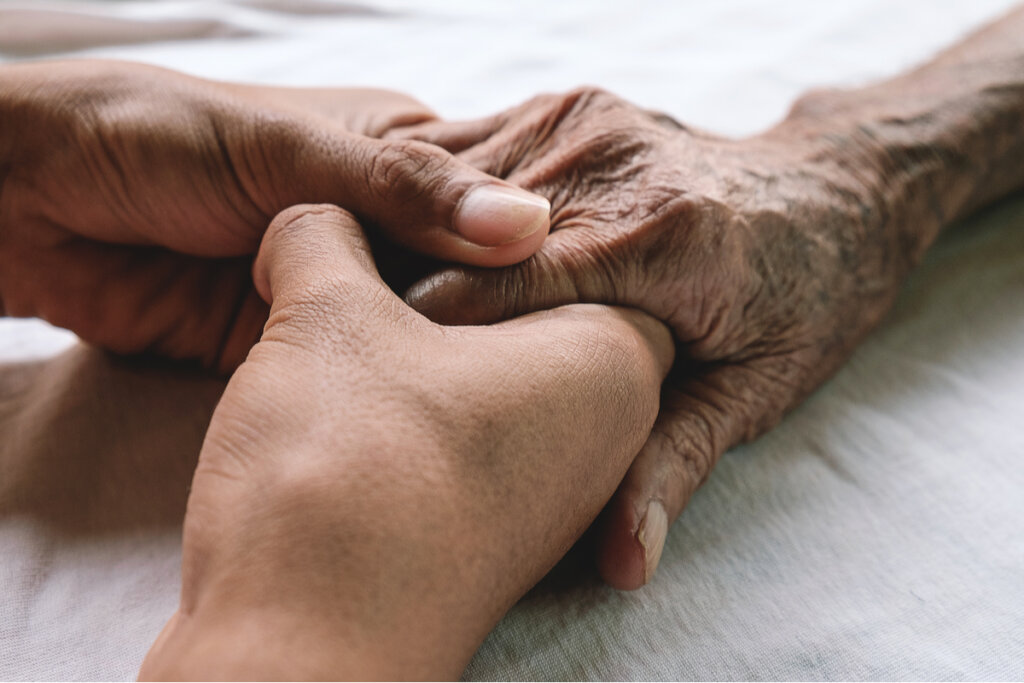Hearing: The Last Sense to Be Lost Before Death

Death is and will continue to be a mystery. In fact, we’ve only scratched the surface in understanding it. However, something that science has recently discovered is that hearing is the last sense that, as a rule, we lose before we die.
We’re all going to die. Therefore, it’s a moment that generates many questions. It’s long been thought that hearing remains active after sight and the other senses fail, even consciousness. Now, there’s a scientific study to corroborate it.
This is quite an important discovery, if we take into account that talking to a loved one before death could be extremely comforting for both parties. Indeed, if the ear is still active, loving words may help people take that final step more calmly.
“Death is easier to bear without thinking of it, than the thought of death without peril.”
-Blaise Pascal-

Hearing at the moment of death
Research concerning hearing at the moment of death was conducted by researchers at the University of British Columbia (Canada) The results were published in the journal, Scientific Reports. The study was conducted with patients at St John’s Hospice in Vancouver who were about to die. Their data was contrasted with a control group made up of healthy people.
The group of researchers, led by Dr. Elizabeth Blundon, monitored the patients through electroencephalograms (EEGs). These measure the electrical activity of the brain and detect if there’s a response to environmental stimuli.
Measurements were carried out both at times when people were conscious and after they’d lost consciousness. They listened to common and rare sounds. The same was done with healthy people. The result was that, in both cases, there was a similar brain response.

Study results
The researchers concluded that people could still hear when they fell unconscious, shortly before they died. Dr. Elizabeth Blundon explained that there’s a point when those who die a natural death enter an unresponsive phase. However, the measurements carried out indicated that they were still able to hear.
Blundon added that “Our data show that a dying brain can respond to sound, even in an unconscious state, until the last hours of life.” This supports the idea that hearing is the last sense to be lost.
However, the researchers don’t know if these sound pickups imply any level of consciousness. In other words, we still don’t know to what extent people in this state can understand the meaning of sounds.
Romayne Gallagher, a doctor who’s also studied this particular subject, believes that there’s some level of awareness. That’s because, throughout her career, she’s observed extremely positive reactions in those who were about to die when they listened to the voices of the people they loved. Nevertheless, the cited study failed to corroborate or rule out this possibility.
Other interesting facts
In 2017, Dr. Sam Parnia, from New York University, also asked many questions about the final moments of life. His own experiences with patients who’d suffered heart attacks and then come back to life led him to believe that brain activity is maintained even after the body is clinically dead.
Parnia asserted that death is a process and not a moment. Therefore, when the lungs stop breathing and the heart stops beating, there’s still activity in the brain. This persists for at least three more minutes. It’s not clear if the person is aware of their own death, but Parnia thinks they are.
Parnia also draws attention to the fact that a person can be revived after a heart attack if there’s no brain damage. He says that this can even be achieved up to five or six hours after ‘death’ and that it’s only possible because the brain continues to function. The subject is fascinating, but, as with so many other subjects, currently, there are more questions than answers.
Death is and will continue to be a mystery. In fact, we’ve only scratched the surface in understanding it. However, something that science has recently discovered is that hearing is the last sense that, as a rule, we lose before we die.
We’re all going to die. Therefore, it’s a moment that generates many questions. It’s long been thought that hearing remains active after sight and the other senses fail, even consciousness. Now, there’s a scientific study to corroborate it.
This is quite an important discovery, if we take into account that talking to a loved one before death could be extremely comforting for both parties. Indeed, if the ear is still active, loving words may help people take that final step more calmly.
“Death is easier to bear without thinking of it, than the thought of death without peril.”
-Blaise Pascal-

Hearing at the moment of death
Research concerning hearing at the moment of death was conducted by researchers at the University of British Columbia (Canada) The results were published in the journal, Scientific Reports. The study was conducted with patients at St John’s Hospice in Vancouver who were about to die. Their data was contrasted with a control group made up of healthy people.
The group of researchers, led by Dr. Elizabeth Blundon, monitored the patients through electroencephalograms (EEGs). These measure the electrical activity of the brain and detect if there’s a response to environmental stimuli.
Measurements were carried out both at times when people were conscious and after they’d lost consciousness. They listened to common and rare sounds. The same was done with healthy people. The result was that, in both cases, there was a similar brain response.

Study results
The researchers concluded that people could still hear when they fell unconscious, shortly before they died. Dr. Elizabeth Blundon explained that there’s a point when those who die a natural death enter an unresponsive phase. However, the measurements carried out indicated that they were still able to hear.
Blundon added that “Our data show that a dying brain can respond to sound, even in an unconscious state, until the last hours of life.” This supports the idea that hearing is the last sense to be lost.
However, the researchers don’t know if these sound pickups imply any level of consciousness. In other words, we still don’t know to what extent people in this state can understand the meaning of sounds.
Romayne Gallagher, a doctor who’s also studied this particular subject, believes that there’s some level of awareness. That’s because, throughout her career, she’s observed extremely positive reactions in those who were about to die when they listened to the voices of the people they loved. Nevertheless, the cited study failed to corroborate or rule out this possibility.
Other interesting facts
In 2017, Dr. Sam Parnia, from New York University, also asked many questions about the final moments of life. His own experiences with patients who’d suffered heart attacks and then come back to life led him to believe that brain activity is maintained even after the body is clinically dead.
Parnia asserted that death is a process and not a moment. Therefore, when the lungs stop breathing and the heart stops beating, there’s still activity in the brain. This persists for at least three more minutes. It’s not clear if the person is aware of their own death, but Parnia thinks they are.
Parnia also draws attention to the fact that a person can be revived after a heart attack if there’s no brain damage. He says that this can even be achieved up to five or six hours after ‘death’ and that it’s only possible because the brain continues to function. The subject is fascinating, but, as with so many other subjects, currently, there are more questions than answers.
All cited sources were thoroughly reviewed by our team to ensure their quality, reliability, currency, and validity. The bibliography of this article was considered reliable and of academic or scientific accuracy.
Llano Escobar, A. (1990). El morir humano ha cambiado. Boletín de la Oficina Sanitaria Panamericana (OSP); 108 (5-6), mayo.-jun. 1990.
This text is provided for informational purposes only and does not replace consultation with a professional. If in doubt, consult your specialist.







